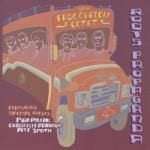
“Roots music through a jazz lens” is how New York scenester Paul Carlon sums up this record. Unlike say, Luis Morais or Tommy McCook, though, you couldn’t really call Carlon a saxophonist working in a roots idiom, and much of Roots Propaganda might more easily be filed under dancefloor jazz. Nevertheless, when Carlon talks roots, he’s talking the entirety of the American continent, from the Delta to Columbia, a kind of jazz Ry Cooder whose press release claim, “roots music can be so hard to find” comes across as slightly disingenuous, not least given the massive success of Cooder’s Cuban revival. Then again, it all depends on what you define as roots music.
Save for some organic beatboxing (more on which below), there’s nothing particularly groundbreaking about Carlon’s Duke Ellington-inspired Afro-Cuban/Brazilian aesthetic, or even the way his octet blow the blues, but they do it with virtuosity and not a little flair, fired by the lived experience of Latin America. It’s an experience digested early on with an exquisite cover of the Baden Powell/Vinícius de Moraes bossa oratorio, “Canto de Xangô”, Carlon leading his lock-tight ensemble from the lyrical to the ecstatic, and that’s without putting much stock by percussion, the de facto oxygen of most Brazilian music. Drummer William Bausch is subtle enough to carry it off, and Carlon is imaginative enough to pitch a rhythmic curveball as the record gathers momentum, replacing upper limbs with lower on the self-penned “Mambo pa’Kanoa”: one Max Pollak comes credited with “rumbatap” and “body percussion”, a syncopated boom-bap which – in tandem with Carlon’s puckish, upswinging accents – makes for an irrepressible blueprint, not so dissimilar to the kind of compulsive, instrumental eccentricity thrummed out by Ken Field’s Revolutionary Snake Ensemble.
Carlon works similar territory with “Ochun”, a brilliant, awkward-sloping funk of Afro chant, whirring reeds and Pollak contortion, with Carlon soloing over the top like a world weary magus. The Afro-religious angle is afforded a more conventional latin-jazz treatment on both the haunting “Morô Omim Má” and “Yorubonics”, as Christelle Durandy – a French singer with roots in Guadeloupe – offers up call as praise in a sultry, sober echo of India.Arie, with Carlon’s soloing once again pinwheeling in extended response.
When Carlon’s flirting with the devil’s music, by contrast, the octet’s dynamic couldn’t be more different: mooching with Ellingtonian intent, a cover of Skip James standard, “Killin’ Floor Blues”, is dominated by the twin trombones of Ryan Keberle and Mike Fahie, as Carlon steps back into the role of reticent usher, making way for the tonal roaming of Fahie’s solo. The trombones likewise lead a benevolent saunter through “Nobody Knows You When You’re Down and Out”, demarcating the territory between Carlon’s domestic heritage and his wider horizons. The two find some kind of mutual recognition in self-composed pieces like “New Life” and “The Limiter”, where the dynamic shifts yet again as Carlon’s jazz democracy offers free passage to Dave Smith’s trumpet and John Stenger’s piano respectively, with Stenger revealing an appetite for Fania-vintage salsa.
If the whole doesn’t always add up to the sum of its parts it’s not for lack of trying; Carlon and Co. clearly love their raw material, and – not least in the collaborations with Pollak – their efforts go at least some way to reclaiming jazz as “roots music” in its own right.

![Call for Papers: All Things Reconsidered [MUSIC] May-August 2024](https://www.popmatters.com/wp-content/uploads/2024/04/all-things-reconsidered-call-music-may-2024-720x380.jpg)



